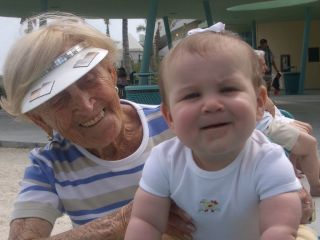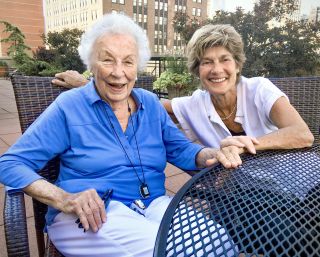
Zelda and great-great grandchild
Source: Courtesy of the Fields family
Parents put a lot of thought and effort into trying to be role models for their children. We’re not perfect, of course, but we want to set an example.
We teach children manners—like to say thank you and be compassionate. But how much thought do we give to what grandparents can add to a child’s development? These interactions can inform a child’s view of older adults and help set the tone for how they interact with people from different generations.
Your children are watching
It’s easy to forget that your children are watching how you treat your parents. Do you respect them? Treat them with dignity? Praise their endeavors or encourage their participation in family life as often as possible?
How you talk about your parents and treat them is likely how your children will honor you and other elders—or not—when you are in your later years.
To better understand this, I asked Melinda Blau, author of The Wisdom Whisperers, who has extensively studied children’s early lives, to explain why grandparents are invaluable in the lives of growing families. The answers go well beyond passing on family history and traditions.
Q: You have grandchildren. What do your grandchildren learn from you?
I have two grandsons, Henry and Sam, who are in college, and a third, Charlie, now 15, who is still at home. I make them more aware of ageism and show them, through my own life, how to keep living, no matter what happens. Once with Charlie, a stranger referred to me as “an old bag.” He still teases me about it, but he also likes that I call myself an old lady! This a great model of inspiration and fortitude to show kids—to embrace life, take what it gives you, and keep moving on.
Q: Ageism and its stereotypes are hard to combat. You call the women in your book, “old ladies.” How is that helpful?
Most of my contemporaries hated that I called these much-older friends “my old ladies.” They thought it was an insult. (“You can’t call them that!”) But my old ladies didn’t mind. When you reach your 90s and 100s, you’re not insulted. That’s what you are—old—and you’re grateful to still be here. I also called them “my old ladies” to change the connotation of that phrase: to mean an active, engaged elder who is still involved in and enjoying life, despite some of the limitations that age can bring.

Marge 100+ with Melinda Blau
Source: Susan Kravitz Photography
These women and likely many older family members use what they’ve learned over the years to master the unexpected twists and turns. Zelda and the others show us that the sparkle of youthful passion can persist well into later years. Zelda played tennis until 99. She continued to take long walks and put on shows at senior centers until she died at almost 105. Marge actively invested in the stock market until she died at 104 and 1/4 years. Sylvia, the “queen” of social engagement, died while planning her own 98th birthday party.
Q: What lessons do the “old ladies” in your book offer parents to encourage children to respect their grandparents and other older relatives and friends and to challenge persistent stereotypes?
They embrace the idea that it’s never too late to try or to do anything you set your sights on. I think that’s the message the ladies in my book send and one reason why parents should expose young children to the older generation. Being with grandparents is also about making children aware of the life cycle and that change—say, in how you walk—is natural, not a reason to panic or mourn.
Q: What can a parent do when no grandparents live close by, they are not active in their grandchildren’s lives, or they are not even alive?
Make friends with another older relative or neighbor or their friends’ parents, people not necessarily related to them. These bonds are mutually enriching, offering us valuable insights and a depth of understanding that is impossible to obtain from our contemporaries.
In my case, they are friends I respect who just happen to be 20 to 30 years older. These are people I don’t have to spend time with out of familial obligation. Parents should choose to have older friends, who have a unique perspective. It’s good for children to see their mother or father reaching up and down the age ladder in the friendships they cultivate.
Q: How do children benefit from relationships with a grandparent or another older adult?
I’ve watched youngsters marvel at a grandparent who at 75 or 80 can beat them on a tennis court or around a pool table. What’s more fun than watching a grandma or grandpa chalk the cue and then sink the 8-ball? Kids marvel at the skill and learn from an older person’s enthusiasm.
Elders can portray courage and a never-give-up attitude that children notice and store away—hopefully, to copy in whatever they may pursue as they grow up. Seeing a grandparent strive helps a child develop similar resolve. Even as a grandparent struggles to overcome an illness, your child sees someone who fights through those difficulties.
Older people with limitations or a disability not only impart messages of persistence and encouragement but also present the opportunity for parents to model caring. Children see what it means to support and help their elders.
Absorbing the messages grandparents and other older friends send can be subtle yet enduring. The messages and lessons pop up and become useful in a child’s life unexpectedly and at different ages and stages.
In her book, Blau peels back the layers of societal judgment around being old to uncover the hard-earned wisdom and resilience that come with the unfolding of years. She writes, “Aging is nothing but a developmental process—growth. It is not the enemy. It’s a gift.”
Wise parents share that gift with their children.
Copyright @2025 Susan Newman
